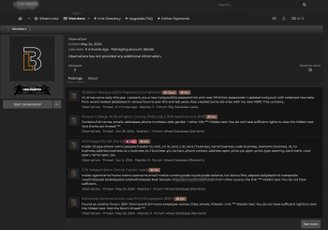A package containing about 10 billion stolen passwords from countless online services has been on sale online since July 4. According to the Internet NewsThis is the The largest set of leaked passwords in historySo far.
The list, called “RockYou2024,” is on a hacker forum. 9,948,575,739 passwordswhich appears in plain text, without any kind of encryption. The huge file includes symbols used by Internet users from all over the world.
 A list of nearly 10 billion leaked passwords found on the ObamaCare forum. (Image: Cybernews/Reproduction)source: Cyber News / Cloning
A list of nearly 10 billion leaked passwords found on the ObamaCare forum. (Image: Cybernews/Reproduction)source: Cyber News / Cloning
The package is believed to be an updated version of the “RockYou2021” program, which was leaked three years ago, and brought Over 8.4 billion stolen access credentialsThis in turn was an extension of the 2009 RockYou hack — hence the group’s name — which exposed 32 million accounts.
As a result, a package containing nearly 10 billion passwords for sale could be the result of work carried out over two decades. It is estimated to collect leaks from over 4,000 databases.according to the report.
Should I be worried?
Experts interviewed by the newspaper said the leaked list contained many corrupted passwords, and pieces of text collected from various sources that were not linked to usernames or profiles. In principle, this information should not be useful for hacking the account..
However, the report highlights the potential for this data to be used in brute force attacks. The method consists of Test different combinations of passcodes and usernames for intrusion.Especially on systems that are not protected against this type of cyber attack.
It is worth noting that there is no 100% effective way to protect credentials. But make sure to create strong and unique passwords for each account, enable two-step authentication and adopt a password manager. Help reduce the risk of improper access.



![[VÍDEO] Elton John’s final show in the UK has the crowd moving](https://www.lodivalleynews.com/wp-content/uploads/2023/06/Elton-John-1-690x600.jpg)

More Stories
What ChatGPT knows about you is scary
The return of NFT? Champions Tactics is released by Ubisoft
What does Meta want from the “blue circle AI” in WhatsApp chats?